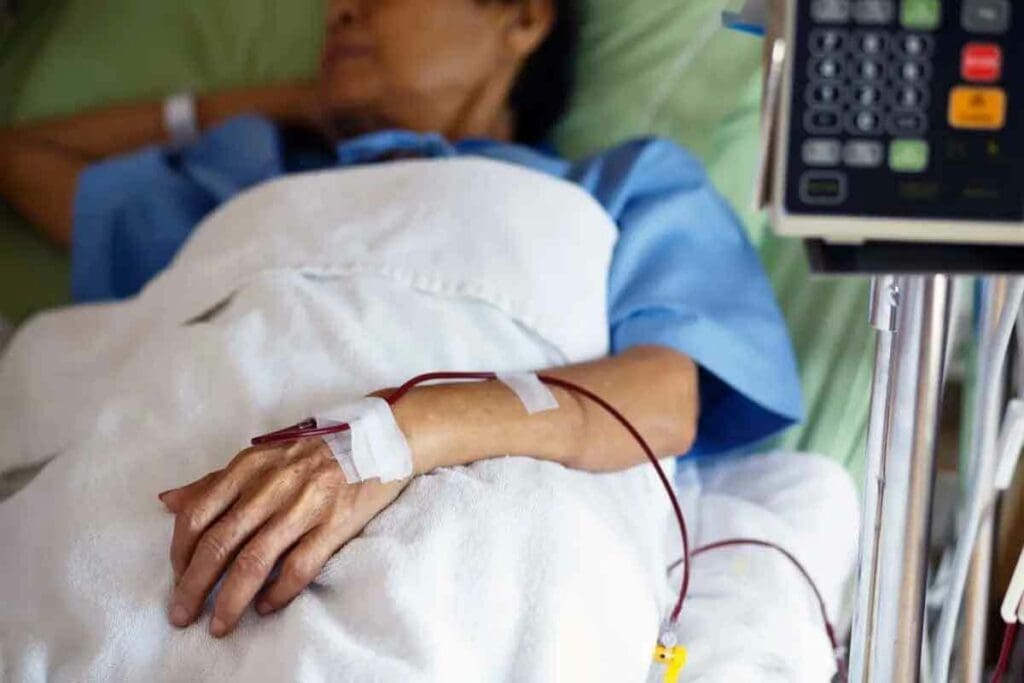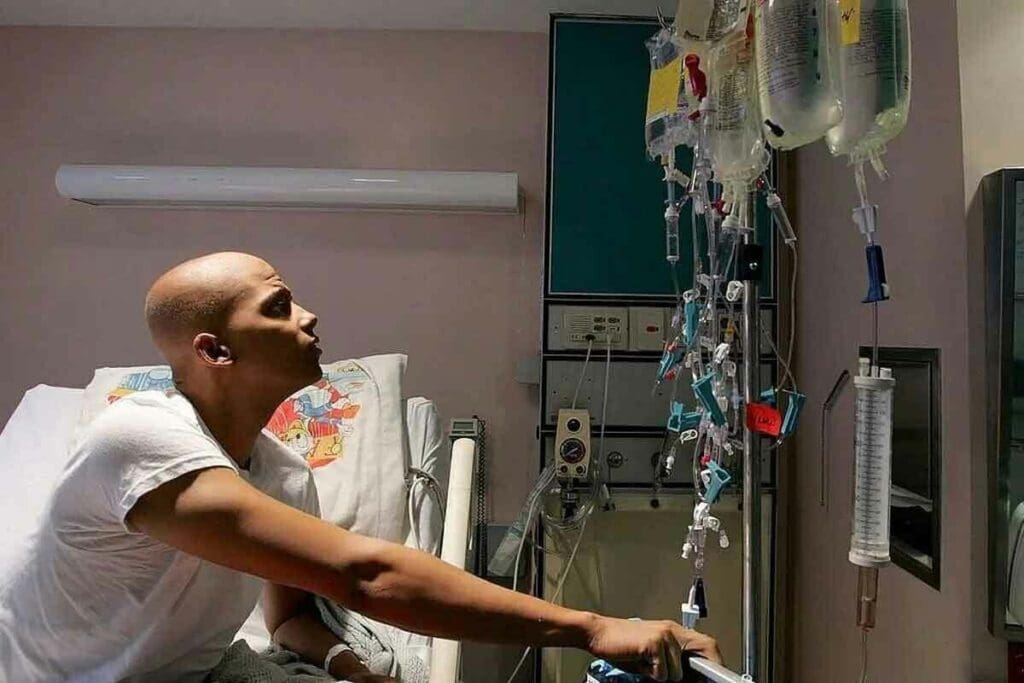Last Updated on November 17, 2025 by Ugurkan Demir

Blood cancer includes diseases like leukemia, lymphoma, and myeloma. These affect the body’s blood-making tissues. Leukemia, for example, is cancer of the body’s blood-making tissues, including bone marrow and the lymphatic system, .
Spotting the symptoms of blood cancer early is key to saving lives. These symptoms can be similar to many other health issues and differ from person to person. At Liv Hospital, we offer top-notch, patient-focused care. We use the newest diagnostic methods and follow strict medical ethics.

It’s important to know about the different blood cancers to catch them early and treat them well. Blood cancer affects the blood, bone marrow, and lymphatic system. We’ll look at the main types and how they affect the body.
Blood cancer is mainly split into three types: leukemia, lymphoma, and myeloma. Leukemia is a cancer of the blood and bone marrow. It happens when there’s too many bad white blood cells.
Lymphoma starts in the lymph system, which is part of the immune system. It can happen anywhere in the body. It’s divided into Hodgkin and non-Hodgkin lymphoma.
Myeloma, or multiple myeloma, is a cancer of plasma cells in the bone marrow. It can cause anemia, bone pain, and infections because of the bad plasma cells.
Each type of blood cancer affects different parts of the body. Leukemia can fill up the bone marrow with bad cells. This can lead to tiredness and more infections.
Lymphoma messes with the lymphatic system. It can make lymph nodes swell and weaken the immune system. Myeloma damages bones and the bone marrow. This can cause bone pain and fractures.
| Blood Cancer Type | Primary Affected Area | Common Symptoms |
| Leukemia | Blood and Bone Marrow | Fatigue, Frequent Infections |
| Lymphoma | Lymphatic System | Swollen Lymph Nodes, Fever |
| Myeloma | Bone Marrow | Bone Pain, Anemia |
Early signs of blood cancer include unexplained fatigue, bone pain, headaches, persistent fever, and abnormal weight loss. Spotting these signs early can help get the right treatment.

Spotting the early signs of blood cancer is key to getting help quickly. Blood cancer includes leukemia, lymphoma, and myeloma. It often starts with small symptoms that can be mistaken for other issues. We’ll look at the important signs you shouldn’t ignore.
Unexplained fatigue and weakness are common early signs of blood cancer. This tiredness doesn’t go away with rest and can make daily tasks hard. Verywell Health says early leukemia symptoms include fatigue, fever, night sweats, and pale skin.
This fatigue happens because blood cancer messes with healthy blood cell production. It reduces oxygen delivery to the body’s tissues and organs.
When energy drops, even simple tasks become tough. It’s important to tell if your tiredness is normal or a sign of something serious. If you’re always weak and tired without a reason, talk to your doctor.
A persistent fever without an obvious cause is another early sign of blood cancer. Fevers are a body’s natural defense against infection. But, if they keep coming back without a reason, it might mean your immune system is off.
“Fever is a common symptom in many types of cancer, including blood cancers. It’s a sign that the body is responding to something abnormal.”
If you keep getting fevers without getting sick, see your doctor right away.
Unintentional weight loss is also a warning sign for blood cancer. Losing weight without changing your diet or exercise is a red flag. In blood cancer, abnormal cells can mess with the body’s systems, causing weight loss.
| Early Sign | Description |
| Unexplained Fatigue | Persistent tiredness not relieved by rest |
| Persistent Fever | Recurring fevers without an obvious cause |
| Unintentional Weight Loss | Losing weight without changes in diet or exercise |
Knowing these early signs can help you get medical help sooner. If you notice any of these symptoms, talk to your doctor.
Knowing the signs of blood cancer can help get medical help early. Blood cancer includes leukemia, lymphoma, and myeloma. It shows in many ways that can really affect a person’s life.
People with blood cancer often have bone and joint pain. This happens when cancer cells build up in the bone marrow. Leukemia, in particular, is known to cause bone pain, feeling like a dull ache or sharp stabbing.
Headaches and dizziness can mean blood cancer, like leukemia. These signs might come from anemia or fewer platelets. This means less oxygen to the brain and other important parts. It’s key to watch these symptoms closely and see a doctor if they keep happening.
Night sweats and chills are signs of blood cancer, often linked to lymphoma. They’re how the body reacts to the cancer. Recurring night sweats, with weight loss and tiredness, need a doctor’s check.
| Symptom | Description | Possible Cause |
| Bone and Joint Pain | Dull ache or sharp pain in bones and joints | Cancer cells accumulating in bone marrow |
| Frequent Headaches and Dizziness | Recurring headaches and feeling dizzy | Anemia or low platelet count |
| Night Sweats and Chills | Excessive sweating at night and feeling cold | Systemic response to cancer, often seen in lymphoma |
Spotting these signs early is key for treating blood cancer. If you or someone you know has these symptoms, getting medical help is important.
It’s important to know the signs of blood cancer early. Blood cancer can mess with how blood cells are made and work. This leads to symptoms that need attention.
Easy bruising and long bleeding times are big signs. Blood cancer can lower platelet counts. Platelets help blood clot. So, even small injuries can cause big bruises or bleeding.
Key signs to watch out for include:
Nosebleeds or bleeding gums often mean blood cancer. This is because of low platelet counts or bad platelets. These are common in blood cancers.
Petechiae are small red spots from tiny blood vessel breaks. The MD Anderson Cancer Center says they might signal blood cancer. They show up in people with low platelet counts.
It’s essential to be aware of the following:
In conclusion, knowing these symptoms can help catch blood cancer early. If you or someone you know has these signs, get medical help right away.
The lymphatic system is key to our immune health. Changes in it can signal serious issues like blood cancer. We’ll look at swollen lymph nodes and an enlarged spleen or liver as signs of blood cancer.
Swollen lymph nodes without pain can be a blood cancer sign. Swollen lymph nodes may mean leukemia, as cancer cells build up. says swollen lymph nodes can be a leukemia symptom.
But, swollen lymph nodes can also mean other things. If you have other blood cancer symptoms, see a doctor.
An enlarged spleen or liver can also be a blood cancer sign. This happens when cancer cells spread to these organs, making them swell. An enlarged spleen or liver can cause pain in the upper left or right abdomen.
Some people might not feel any symptoms. Regular doctor visits can catch these changes early.
Knowing about these lymphatic system changes is key to catching blood cancer early. If you notice swollen lymph nodes or an enlarged spleen or liver, talk to your doctor.
Blood cancer often shows symptoms related to blood. But it can also affect your breathing and digestion. It’s important to know how these symptoms might be linked to blood cancer.
A cough or chest pain that lasts can be a sign of blood cancer, like leukemia. Leukemia cells can build up in the lungs or chest. Seek medical help if you have a cough or chest pain that doesn’t get better.
Feeling uncomfortable or full in your stomach is another warning sign. An enlarged spleen or liver, seen in some blood cancers, can cause this. The discomfort may feel like a dull ache or a sensation of fullness, even after eating a small amount of food.
Spotting these symptoms early is key to catching blood cancer. If you’re feeling any of these, see a doctor right away.
Blood cancer symptoms in women can be different from those in men. This makes diagnosis and treatment harder. It’s key to know these differences for early detection and better care.
One way blood cancer shows up in women is through heavier menstrual periods. Women with leukemia might have menorrhagia. This means their periods are very heavy or last too long.
This symptom is a sign of blood cancer. It happens because the body can’t make blood clots well.
Women with blood cancer often get recurrent infections. This is because their immune system changes. Blood cancers like leukemia and lymphoma mess with white blood cell production.
This makes it tough for the body to fight off infections. Women might get infections that are hard to treat or very severe.
Symptoms of blood cancer in women are often misdiagnosed. Fatigue and weakness are often seen as stress or hormonal issues. It’s important to think of blood cancer when women have symptoms that don’t go away.
Knowing how blood cancer shows up differently in women helps us catch it early. Women and doctors need to be on the lookout for these symptoms. This way, we can treat blood cancer better.
As blood cancer gets worse, patients face many advanced symptoms. These symptoms can really hurt their quality of life. They need a lot of medical help to manage them.
Severe, persistent anemia is a key sign of advanced blood cancer. It happens when the body lacks red blood cells or has low hemoglobin. This leads to tiredness, weakness, and shortness of breath.
In the last stages, multiple organ involvement is common. The cancer spreads to places like the liver, spleen, or lymph nodes. This causes problems and can lead to failure.
Symptoms include stomach pain, swelling, and trouble breathing.
Frequent, hard-to-control bleeding episodes are another sign. Patients might get nosebleeds, bleeding gums, or bruise easily. This is because of low platelet counts or platelet problems.
These bleeding issues are serious and need quick medical help.
It’s important for patients and their families to know about these signs. While they’re tough, there are treatments and ways to help. These can make life better, even in tough times.
It’s important to know how blood cancer shows up on the skin to catch it early. Blood cancers like leukemia, lymphoma, and myeloma can cause skin symptoms. These symptoms are key signs of the disease.
The MD Anderson Cancer Center says leukemia can lead to petechiae and purpura on the skin. These happen because of low platelet counts or platelet problems, common in blood cancer patients.
Skin symptoms of blood cancer look different on everyone. For example, petechiae – tiny red or purple spots – are easier to see on lighter skin. They can be harder to spot on darker skin. Doctors need to know this to avoid mistakes.
Purpura, which are bigger patches of purple or red, and bruises are common signs of blood cancer. They happen because of bleeding under the skin, often due to low platelets. The way these signs show up can help doctors figure out what’s going on.
“The presence of purpura and bruising should prompt further investigation for blood cancer, specially if these symptoms are unexplained or persistent.”
Besides petechiae, purpura, and bruises, blood cancer can cause other skin changes. These include skin lesions, rashes, and changes in skin color. Some people might also feel itching or pain in these areas. Spotting these signs early can help doctors treat the cancer sooner.
It’s key for people to watch for these skin signs and see a doctor if they notice anything odd or lasting. Catching blood cancer early can greatly improve treatment results.
It’s important to know the signs of blood cancer early. If you’re feeling very tired, getting sick a lot, or bruising easily, see a doctor. These could be signs of blood cancer.
If you notice any symptoms of blood cancer, like heavier periods or infections that keep coming back, don’t ignore them. These are serious signs that need medical attention.
Says getting help quickly is key. If you’re not sure when to see a doctor, ask one. Being proactive about your health can help a lot in finding and treating blood cancer.
Common symptoms include feeling very tired, having a fever that won’t go away, and losing weight without trying. You might also feel pain in your bones and joints, get headaches often, and have night sweats.
Blood cancer can harm the body’s blood-making tissues, immune system, and other organs. This can lead to symptoms like anemia, getting sick easily, and bleeding a lot.
Women might notice heavier periods, keep getting infections, and feel changes in their immune system. These signs can be missed if not checked right.
Signs that blood cancer has gotten worse include severe anemia, problems with many organs, and bleeding that’s hard to stop. These need quick medical help.
Blood cancer can show on the skin in different ways, like purpura or bruising patterns. These changes should be checked by a doctor.
Early leukemia signs include feeling very tired, having a fever, and losing weight. You might also bleed or bruise easily and get sick a lot.
Yes, lymphoma can lead to symptoms like a persistent cough or chest pain. These should be checked by a doctor.
Myeloma is diagnosed with tests like blood work, bone marrow biopsies, and imaging studies. These help find cancerous plasma cells.
Adults might feel tired, lose weight, have fever, and bleed or bruise easily. They might also have bone pain and get sick a lot.
Yes, blood cancer can cause skin symptoms like purpura, bruising, and other changes. These should be checked by a doctor.
Yes, blood cancer can lead to digestive symptoms like stomach discomfort and feeling full. These should be checked by a doctor.
Blood cancer can affect the lymphatic system, causing swollen, painless lymph nodes and an enlarged spleen or liver.
Subscribe to our e-newsletter to stay informed about the latest innovations in the world of health and exclusive offers!